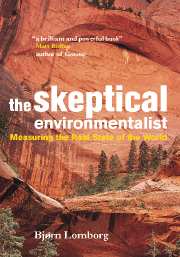Book contents
- Frontmatter
- Contents
- List of figures
- List of tables
- Preface
- Language and measures
- Acknowledgements
- Permissions
- Part I The Litany
- Part II Human welfare
- 3 Measuring human welfare
- 4 Life expectancy and health
- 5 Food and hunger
- 6 Prosperity
- 7 Conclusion to Part II: unprecedented human prosperity
- Part III Can human prosperity continue?
- Part IV Pollution: does it undercut human prosperity?
- Part V Tomorrow's problems
- Part VI The Real State of the World
- Notes
- Bibliography
- Index
3 - Measuring human welfare
Published online by Cambridge University Press: 05 March 2013
- Frontmatter
- Contents
- List of figures
- List of tables
- Preface
- Language and measures
- Acknowledgements
- Permissions
- Part I The Litany
- Part II Human welfare
- 3 Measuring human welfare
- 4 Life expectancy and health
- 5 Food and hunger
- 6 Prosperity
- 7 Conclusion to Part II: unprecedented human prosperity
- Part III Can human prosperity continue?
- Part IV Pollution: does it undercut human prosperity?
- Part V Tomorrow's problems
- Part VI The Real State of the World
- Notes
- Bibliography
- Index
Summary
In this chapter we shall look at the state of human welfare. First, of course, we have to define what the term implies. Welfare is obviously not a discussion confined to money, but one about the whole human's potential to develop.
According to the UN, “the real objective of development should be to create an enabling environment for people to enjoy long, healthy and creative lives. Though this may appear to be a simple truth, it is often forgotten in the immediate concern with the accumulation of commodities and wealth.” But how do we measure human welfare? There are many ways of investigating to what extent mankind has been given better surroundings in which their lives can unfold.
The UN introduced the so-called Human Development Index for this very purpose. The index attempts to elucidate what kind of surroundings people have in which to make a good life for themselves. The intention is to measure how long people can expect to live, how much knowledge they can acquire, and how high a living standard they can achieve. In practical terms it measures life expectancy, the proportion of illiterates, school attendance in years, and income. The World Bank endeavors in a similar way to evaluate people’s quality of life on the basis of life expectancy, malnutrition, access to clean water and sanitation, illiteracy and energy consumption
- Type
- Chapter
- Information
- The Skeptical EnvironmentalistMeasuring the Real State of the World, pp. 45 - 49Publisher: Cambridge University PressPrint publication year: 2001



